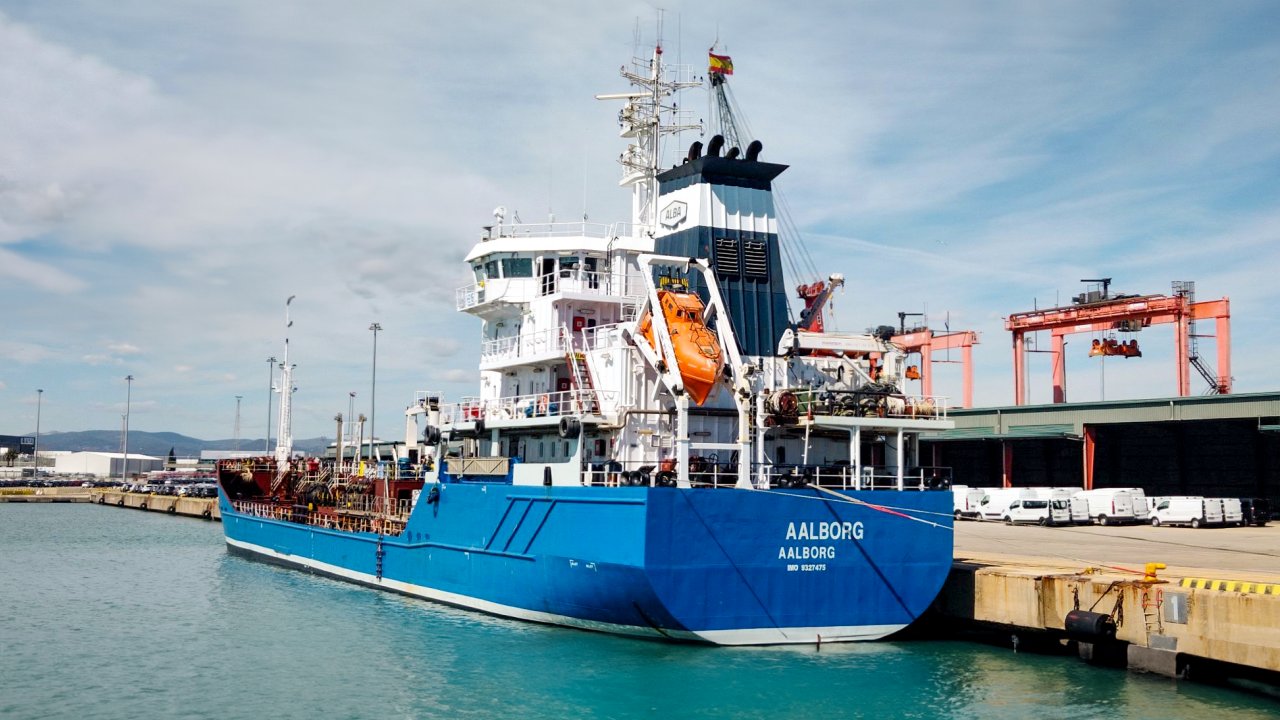
 |
Physical bunker supplier Peninsula has added the IMO II chemical tanker Aalborg to its sustainable fuel distribution capacity in the Western Mediterranean.
The vessel is capable of supplying 100% biofuels (B100), in contrast to traditional fuel barges that cannot exceed a bio component of 25%. It supplies fatty acid methyl esters ( FAME) produced from vegetable oils and allows for neutral emissions (depending on the origin of these vegetable oils), thereby reducing a receiving vessel’s carbon footprint.
The Aalborg's ability to blend multiple bio feedstocks and traditional fuels on board, together with a certificate detailing the bio component percentage, will enable ship owners to comply with impending Fuel EU Maritime regulation using the same engine.
Alejandro Morales Moreno, Supply Manager at Peninsula, emphasised the collaborative efforts between Peninsula and the Port of Barcelona, highlighting a shared vision for emissions reduction. He noted: "The addition of the Aalborg creates a meaningful, new decarbonisation solution for our customers and we're grateful to the Port Authority for facilitating its deployment in Barcelona."
Lluís Salvadó, president of the Port of Barcelona, remarked: "The importance of having a biofuel supply vessel permitted to supply up to 100% bio component, will provide Port of Barcelona users with a solution to decarbonise their activity and to fully comply with EU regulations. The Port of Barcelona, as part of its Energy Transition Plan, is committed to transition and alternative fuels such as LNG, green methanol or green ammonia, as well as biofuels, which will help to reduce the maritime sector's carbon footprint."

|
ICS webinar explores regulatory framework for nuclear-powered merchant ships
Industry experts discuss the timeline and challenges for adopting nuclear propulsion in the commercial shipping sector. |
|
|
|
||

|
Oilmar DMCC seeks senior bunker trader for Dubai office
Dubai-based energy trader recruiting for Middle East, Indian subcontinent and Africa trade flows. |
|
|
|
||

|
Oilmar DMCC seeks bunker traders for Singapore office
Dubai-based trader recruiting mid-level and senior professionals to expand Asia-Pacific marine fuels operations. |
|
|
|
||

|
ClassNK updates EU shipping emissions guidance for LNG-fuelled vessels
Japanese classification society releases revised FAQs addressing methane slip measurement procedures. |
|
|
|
||

|
Bureau Veritas delivers first 15,000-teu methanol dual-fuel container ship for CMA CGM
Classification society completes delivery of CMA CGM Monte Cristo built by DSIC Tianjin. |
|
|
|
||

|
IBIA announces new date for mass flow meter training course in Rotterdam
Training scheduled for 12 May follows mandatory MFM implementation at Rotterdam and Antwerp-Bruges ports. |
|
|
|
||

|
Maersk and Hapag-Lloyd suspend Strait of Hormuz transits amid Middle East security crisis
Container carriers reroute services around the Cape of Good Hope as military conflict escalates. |
|
|
|
||

|
Operations continue as normal at most Middle East ports
Most facilities operating normally, with exceptions in Bahrain, Oman and Saudi Arabia. |
|
|
|
||

|
Naftomar takes delivery of 93,000-cbm dual-fuel ammonia carrier
Gaz Ronin features a MAN dual-fuel engine with high-pressure selective catalytic reduction technology. |
|
|
|
||

|
AYK Energy completes world’s largest marine battery retrofit on Wasaline ferry
Aurora Botnia receives 10.4 MWh battery system, bringing total capacity to 12.6 MWh. |
|
|
|
||
| Med ECA approved; zero 2050 target gains traction [News & Insights] |